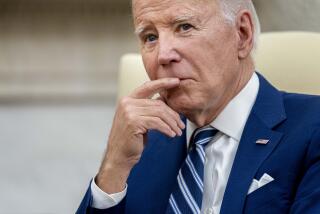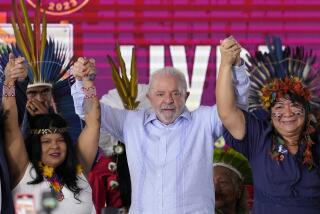But Pragmatic Leader Seems Vulnerable at Top Level Where It Counts : Protesters Want Reformer Zhao as Their Champion
- Share via
BEIJING — Nominally, he was China’s top leader as general secretary of the Communist Party, but when Zhao Ziyang disappeared from the public eye amid the confusion brought on by last weekend’s martial-law declaration, the paramount question in Chinese politics was whether this pragmatic economic reformer has a true power base of his own.
The answer is both yes and no. While the drama of a nonviolent student uprising unfolds on Tian An Men Square and in the streets of provincial capitals across the world’s most populous nation, it is becoming clear that proponents of democratic reform would like to adopt Zhao as their champion.
But where it counts, in the crusty echelons of China’s senior political and military leadership, Zhao appears to be highly vulnerable. Worse, it could still be that he derives his clout largely through the patronage of Deng Xiaoping, China’s venerable, unofficial sovereign, who is now reportedly siding with Zhao’s hard-line opponents in the government.
Protege of Deng
Zhao, 69, has been identified as a Deng protege since he first rose to national prominence, becoming premier in 1980. Zhao’s job was to carry out Deng’s bold vision of opening China economically to the West and implementing a program of market-oriented economic reforms. He performed the task so well that he was named head of the 48-million-member Communist Party in 1987 and emerged as one of the strongest candidates to succeed Deng, who is 84 and had been expected to retire soon.
Threat From Conservatives
Now, however, Zhao appears threatened by the same reactionary forces that undermined his predecessor as party chief, Hu Yaobang, another erstwhile Deng protege and reformer who erred by taking a tolerant line on student protests rocking the country in 1986. Hu’s death on April 15 ignited the most recent wave of campus protests, which, under the spotlight of a historic Sino-Soviet summit in Beijing last week, elicited an astonishing outpouring of support by ordinary Chinese.
Although they are far removed from the power struggle purported to be raging in Zhongnanhai, the walled compound in Beijing where the ruling elite reside, many of the protesters see Zhao as the only leader qualified to deliver on their demands for free speech, an uncensored press and some sort of apparatus--within the present one-party socialist system--that would allow the masses to steer the government by expressing their will.
Ironically, Zhao is tainted by the kind of allegations of high-level corruption and nepotism that have been the centerpiece of public outrage. But he has also demonstrated himself to be the most conciliatory of the top leaders, reportedly opposing his archrival, Premier Li Peng, and other hard-liners who decided to declare martial law Saturday to crack down on the students.
Li lost credibility when officers and soldiers of the People’s Liberation Army decided not to fight their way through citizen barricades to take Tian An Men Square; Zhao gained it by distancing himself from the aborted military mission, which students have branded “ridiculous” and one army commander admitted was “humiliating.” Zhao was last seen publicly on the plaza Friday, tearfully extending a warm gesture of sympathy to students on a hunger strike.
Probe of Family
He is even reported to have suggested to the Standing Committee of the Politburo that a campaign against graft begin with an investigation of his two sons.
Whether he will be purged or prevail over his comrades, Zhao is no stranger to the vicissitudes of revolutionary politics. The son of a wealthy provincial landowner, Zhao joined the Communist Party in 1938 at age 19. One of his first jobs after the Communists won power in 1949 was in a zealous campaign against landowners in Guangdong province.
Through this experience in land reform, however, Zhao saw the failures of collective farming and would later advocate more pragmatic applications of Chairman Mao Tse-tung’s rigid socialist ideology.
Governor of Sichuan
That bent landed him in trouble as a “counterrevolutionary revisionist” during the turmoil of the Cultural Revolution. In 1967, Red Guards placed a dunce cap on his head and paraded him through the streets of Canton. Deng, the senior leader, was similarly purged during the decade of radical terror.
Zhao rebuilt his career by serving the party in such places as Inner Mongolia, however, and as governor of Sichuan province in the late 1970s, he introduced a successful program of private tilling that is credited with averting famine and established him as an architect of economic reform.
“We must not bind ourselves as silkworms do within cocoons,” Zhao said in a 1979 speech that is often cited. “All economic patterns and conventions that hold back the development of productive forces should be abolished.”
The following year, Zhao and Hu Yaobang were installed in the Politburo’s Standing Committee by their mentor, Deng. After he took over as party chief following Hu’s ouster in January, 1987, the official New China News Agency lionized Zhao by saying he “firmly carried out the guidelines laid down by Deng Xiaoping and the party Central Committee and took effective measures to ensure the struggle against bourgeois liberalization”--a reference to containing the last round of student unrest.
More to Read
Sign up for Essential California
The most important California stories and recommendations in your inbox every morning.
You may occasionally receive promotional content from the Los Angeles Times.













